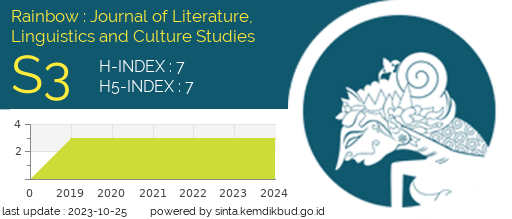Probing Proverbial Propositions in Xitsonga Discourse in Vutlhari bya Vatsonga Machangana and Tinhlungu ta Rixaka Dictionary.
DOI:
https://doi.org/10.15294/rainbow.v13i2.10233Keywords:
communicative meaning, figurative language, proverb, youth, XitsongaAbstract
Vatsonga largely rely on proverbial expressions and other forms of figurative language in their daily discourse to convey various messages and lessons. In fact, Vatsonga are famously known for their instructive slogan, Mitirho ya vulavula, loosely translated as action speaks, which they use to prod one another towards striving for good deeds and to use deeds as a testimony to a person’s character. Due to their recurrent use in Xitsonga folklore, proverbs are often used by Vatsonga to instil cultural mores and autochthonous wisdom to the youth and other members of society. Hence, Vatsonga youth often use proverbs among themselves during conversations. Underpinned by the context theory of meaning and the qualitative research approach, the article analysed five purposively selected proverbs from two texts, Vutlhari bya Vatsonga Machangana by Junod (2017) and Tinhlungu ta rixaka dictionary by Marhanele and Bila (2016) to highlight the relevance and significance of proverbs to the youth. The findings demonstrate that proverbs are a significant tool for influencing and redirecting contemporary youth to fit societal cultural standards and expectations. The article recommends using paremiology to redirect and guide the youth's upbringing. This will teach Vatsonga the customs and methods of culture, as well as make their lives easier in a variety of situations
Downloads
Published
Article ID
10233Issue
Section
License
Copyright (c) 2024 Ndzalama Maluleke (Author)

This work is licensed under a Creative Commons Attribution 4.0 International License.






